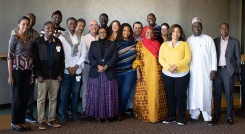Vanderbilt-Mozambique Biomedical Informatics (VM-BMI)
Posted in
In collaboration, the Universidade Eduardo Mondlane (UEM) in Mozambique and the Vanderbilt Institute for Global Health (VIGH) have partnered to establish the Vanderbilt-Mozambique Biomedical Informatics (VM-BMI) training and research program, the first of its kind in Portuguese-speaking (Lusophone) African countries, with a specific focus on HIV. BMI uses computational and information sciences approaches primarily in biology and human health. VM-BMI will have several components.
Know your Status
Posted in
Building on the success of a pilot program training traditional healers to initiate HIV counseling and testing, the Vanderbilt Institute for Global Health and the University of Witwatersrand have partnered to expand healer-initiated HIV testing and linkage to care in South Africa.The study team will conduct a cluster, randomized, controlled trial comparing healer-initiated HIV counseling and testing to the standard of care in rural South Africa by utilizing an existing and trusted resource — traditional healers.
Vanderbilt-Nigeria Research Ethics Training (V-NET)
Posted in
Vanderbilt Institute for Global Health (VIGH) and collaborators Aminu Kano Teaching Hospital (AKTH) and Bayero University (BUK) have partnered to establish the Vanderbilt-Nigeria Research Ethics Training Program (V-NET). The program is a comprehensive initiative that encompasses curricular development, didactic coursework, skills development, mentoring, and practicum experiences designed to build capacity for the ethical design, conduct, and oversight of genetic and genomic research in Nigeria.
Vanderbilt-Vietnam Genetic Epidemiology Training Program (V2- GENE)
Posted in
The Vanderbilt Institute for Global Health (VIGH), Hanoi Medical University (HMU), and the Vietnam National Cancer Institute (VNCI) have partnered on a new training program from the Fogarty International Center of the National Institutes of Health. The Vanderbilt-Vietnam Genetic Epidemiology Training Program (V2- GENE) is an initiative to train scholars in the genetic epidemiology of noncommunicable diseases (NCDs).
Vanderbilt-Nigeria Biostatistics Training Program (VN-BioStat)
Posted in
Fellowship applications are open for this NIH collaborative research training grant focused on creating a cohort of highly skilled Nigerian biostatisticians who can lead and supervise high-level biostatistics activities for HIV research studies in West Africa.The focus includes hands-on biostatistics training. Trainees will take biostatistics courses, become members of a team of biostatisticians doing HIV research at Vanderbilt, and be assigned to HIV research projects using data from Aminu Kano Teaching Hospital (AKTH).
Stroke Prevention in Nigeria: SPRING 2
Posted in
In 2020, the SPRING research team completed a multicenter phase III randomized controlled trial fo
Applying Research for a Healthy Liberia
Posted in
The University of Liberia College of Health Sciences is the leading educational institution for developing Liberia’s clinicians, researchers, health policymakers and innovators.
Optimal Management of HIV Infected Adults at Risk for Kidney Disease in Nigeria
Posted in
Principal Investigator(s): Muktar Aliyu, M.D., M.P.H., Dr.P.H.William Wester, M.D., M.P.H.
Bridging the Childhood Epilepsy Treatment Gap in Africa (BRIDGE)
Posted in
Principal Investigator: Edwin Trevathan, MD, MPH
Childhood Status Epilepticus and Epilepsy Determinants of Outcome (SEED)
Posted in
Status epilepticus (SE) is the most common serious neurological emergency among children worldwide. In the low- and middle-income countries (LMICs) of sub-Saharan Africa, the burden of childhood SE-associated mortality and morbidity appears to be especially high. However, the phenotypes of childhood SE, clinical predictors of SE-associated mortality and of SE-associated neurodevelopmental morbidity, and genomic predictors of SE, SE-associated mortality and neurodevelopmental morbidity have not been well-characterized in this region.
Vanderbilt-Nigeria Research Administration and Management Training Program (V-RAMP)
Posted in
Expanding on the decade-long Vanderbilt-AKTH partnership, Aminu Kano Teaching Hospital (AKTH), Bayero University Kano (BUK) in Kano, Nigeria, and the Vanderbilt Institute for Global Health (VIGH) are partnering on a new infrastructure development training program supported by the Fogarty International Center of the National Institutes of Health (NIH). The project will strengthen Nigeria's research administration and ethics infrastructure capacity.
UNZA-Vanderbilt Partnership for HIV-NCD Research (UVP-2)
Posted in
The UNZA-Vanderbilt Training Partnership for HIV-Nutrition-Metabolic Research (UVP-1) and the UNZA-Vanderbilt Partnership for HIV-NCD Research (UVP-2) continue a longstanding training collaboration between the University of Zambia School of Medicine/University Teaching Hospital (UNZA/UTH), Vanderbilt University (VU) and the Vanderbilt Institute for Global Health (VIGH).
Vanderbilt Institute for Research Development and Ethics (VIRDE)
Posted in
VIRDE is an annual intensive research training program designed to facilitate trainee research productivity in low- and middle-income countries (LMICs). This month-long program is intended to bolster and further develop the skill sets necessary for conducting responsible human subjects’ research and developing a grant proposal for submission. Attendees participate in a series of grant writing, research ethics/scientific integrity, and career development seminars and workshops.
Clinical and genetic risk factors associated with adverse long-term health outcomes after curative therapies in individuals with sickle cell disease
Posted in
The primary objective is to implement a personalized approach to curative therapies for children and adults with sickle cell disease (SCD) to maximize benefits while minimizing adverse outcomes. Current efforts to understand long-term health outcomes after these therapies are limited. The focus on initial treatment success recalls developments in pediatric oncology during the 1980s, where effective therapies eventually led to increased risks of organ dysfunction and malignancies.
Vanderbilt-Nigeria Building Research Capacity in HIV/Non-communicable Diseases (V-BRCH)
Posted in
https://vumc.org/v-brch
The Vanderbilt-Nigeria Building Research Capacity in HIV/Non-communicable Diseases (V-BRCH) Program builds capacity of Nigerian investigators to successfully initiate and implement high-quality clinical trials in HIV-associated non-communicable diseases.
